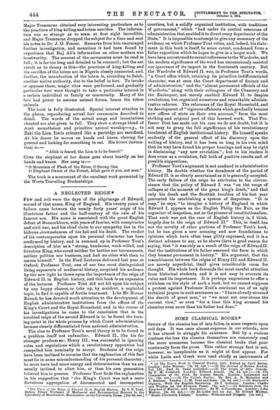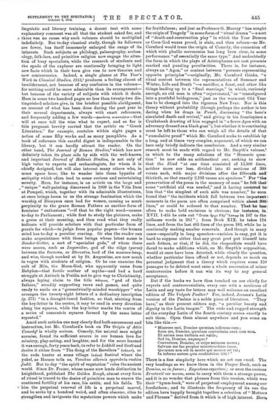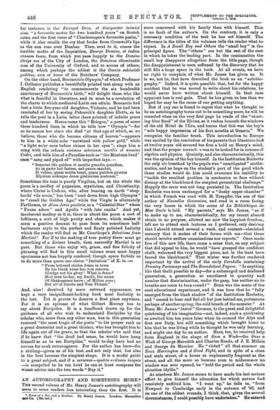SOME CLASSICAL BOOKS.* STUDY of the classics has of late
fallen in some respects upon evil days. It was once almost supreme in our schools ; now it has almost to struggle for existence. But by a curious contrast the less the classics themselves are commonly read the more numerous become the classical books that pour continually from the press. This rather strange fact is not, however, so inexplicable as it might at first appear. For while Latin and Greek were used chiefly as instruments of
• (1) The Year's Work in Classical Studies, 1913. Edited by Cyril Bailey. London: John Murray. [2s. 6d. net.]—(2) The Journal of Roman Studies. Vol. III., Part II. Same publisher.—(3) The Origin of Attic Comedy. By F. M. Cornford. London Edward Arnold. [8s. 6d. net.]—(4) The Composition ethe Iliad. By Austen Smyth. London : Longmans and Co. [6s. net. —(5) The Vulgate Psalter. By Rev. A. B. Macaulay and J. Brebner. London : J. M. Dent and Sons. [29. 6d. net.]—(6) Boccaccio's Olympia. With the English Rendering. By I. Gollancz. London : Chatto and Windus (at the Florence Press). [6s. net.]—(7) Selections from the Epigrams of Martial, with Translation. By W. J. Courthope. London John Murray. [Ss. 6d. net.]—(8) Euripides and his Age. By Gilbert Murray. ." Home University Library." London : Williams and Norgate. [la. net.] •
linguistic and literary training, a decent text with some explanatory comment was all that the student asked for, and
e there was no cause why such volumes should be multiplied indefinitely. But to-day classical study, though its followers are fewer, has itself immensely enlarged the range of its interests. Such subjects as philology, palaeography, archae- ology, folk-lore, and primitive religion now engage the atten- tion of busy specialists, while the research of students and the spade of the explorer are continually bringing to light new facts which in their turn give rise to new theories and new controversies. Indeed, a single glance at The Year's Work in Classical Studies, 1913,1 produces a feeling almost of bewilderment, not because of any confusion in the volume— for nothing could be more admirable than its arrangement— but because of the variety of subjects with which it deals. Here in some two hundred pages no less than twenty-two dis- tinguished scholars give, in the briefest possible abridgment, an account of what has been done during the past year in their several departments, always with exact references, and frequently adding a few words—I:Kepi:1,ra aureroialv—that will at once tell the wise what to expect, and so far is this pregnant brevity carried that the article on " Greek Literature," for example, contains within eight pages a notice of some fifty works and. as many pamphlets. As a book of reference this careful digest is indispensable to the library, but it can hardly attract the reader. On the other hand, The Journal of Roman Studies,' which has now definitely taken its place side by side with the well-known and important Journal of Hellenic Studies, is not only of high value to experts and archaeologists, for whom it is 'chiefly designed, but will also interest many others who, in some spare hour, like to wander into those bypaths of antiquity which often lead to some curious and entertaining 'novelty. Here, for instance, is an article on the large and " unique " wall-painting discovered in 1909 in the Villa Item at Pompeii, which, together with its admirable illustrations, at once brings home to us the strange fascination which the worship of Dionysus once had for women, causing as much perplexity to the grave Roman Fathers as another form of feminine " enthusiasm "—if that be the right word-causes .to-day to Parliament ; while first to study the pictures, make a guess at their meaning, and then read what they really indicate will provide scholars with, that particular form of puzzle for which—to judge from popular papers—the human mind has to-day a peculiar craving. Or else the reader can .make acquaintance with those beings whose latest name is Sonder-Goiter, a sort of " specialist gods," of whom there were scores, such as Imporcitor, god of the ridge (porca) between the furrows, or Sterculus, lord of the manure-heap, and who, though mocked at by St. Augustine, are now much in vogue with students of religion. Or be can examine the cult of Wm, the Moon-God, who apparently came from Babylon—that fertile mother of myths—and bad a hard struggle at Antioch in Pisidia not to give way to Christianity, always laying claim to the title irciTptos, "god of their fathers," steadily supporting races and games, and quite ready to smile on a "geometrically-minded worshipper" who arranges the twenty-eight letters of a dedicatory inscription ,(p. 271) "in a draught-Iyoard fashion, so that, starting, from the key-letter in the centre, it may be read in every direction along the squares, while the key-letter marks the centre of .a series of concentric squares formed by the same letter repeated."
Amid such articles one may clearly find both amusement and instruction, but Mr. Cornford's book on The Origin of Attic Comedy' is wholly serious. Comedy, the natural man might surmise, found its sufficient source in our human love for mimicry, play-acting, and laughter, and for the more learned it was enough, forty years back, to refer to Liddell and Scott and derive it either from "The Song of the Revellers " (KrojaaS), or the rude banter at some village (eoSaa) festival where the yokel, as Horace tells us, Versibus alternis opprobria rustica fudit. But to-day "the spirit of vegetation" rules the ancient world. Since Dr. Fraier, whose name now lends distinction to knighthood, published. The Golden Bough, almost every form of ritual is traced to the desire of primitive man to ensure the continued fertility of his race, his cattle, and his fields. To him the perpetual renewal of life is a perpetual marvel, and be seeks by a hundred weird, and often obscene, rites to .strengthen and invigorate the mysterious powers which make
for fruitfulness; and just as Professor G. Murray "has sought the origin of Tragedy " in some form of "ritual drama "—a sort of "death-and-resurrection play" in which the Year Demon or Corn-God waxes proud, is slain, and then reborn—so Mr. Cornford would trace the origin of Comedy, the connexion of which with phallic ceremonies has long been clear, to some performance "of essentially the same type." And undoubtedly the form in which the plays of Aristophanes are cast presents marked and puzzling peculiarities. There is, for instance, always an " Agon," or contest between "persona representing opposite principles "—originally, Mn Cornford thinks, "a ritual contest between the representatives of Summer and Winter, Life and Death "—a sacrifice, a feast, and other like things leading up to a "final marriage,"• in which, curiously enough, an old man is often " rejuvenated," or " transfigured into a youthful bridegroom," just as the worn-out Old Year has to be changed into the vigorous New Year. Nor is this
theory without probability (though perhaps the author is too daring when he drags in Punch, discussing " the hero's simulated death and revival," and giving in his frontispiece a Cruikshank drawing of him engaged in " a fierce Agon with an adversary dressed as a black goat"), but whether it is convincing
must be left to those who can weigh all the details of that " cumulative proof " which Mr. Cornford seeks to establish by a long, and at times very complex, argument, of which we can here only briefly indicate the conclusion. And a very similar remark must be made with regard to Mr. Smyth's volume,* in which to the many solutions of the " Homeric ques- tion" lie now adds an arithmetical one, seeking to show
that the Iliad "at one time consisted of 13,500 -lines, neither More nor less, divided into 45 sections of 300 verses each, with major divisions after the fifteenth and thirtieth, so that exactly 2,193 verses are spurious." For "the.. preserVation of the poem in the memory of man" he felt that some " artificial aid was needed," and it having occurred to: him that " the simplest of such aids was number," he soon
found that " the incidents which fall between two importanti
moments in the poem are often comprised within about-ZOO:S. lines," or could be reduced to that number. That he- ham often to make bold excisions is obvious; for instance, in XVII. 1.455 be cuts out "from ipxe riirEtercep in 107 to the selfsame words in 262" ; from Book XIX. he takes 124 lines, and from the last 483 lines of the poem 183, while he is continually making smaller removals. And though in many cases—especially in long speeches—excision is easy, yet it is
hard to suppose either that any great poet put- himitelf into such fetters, or that, if he did, the rhapsodists would have dared to make additions which, on Mr. Smyth's supposition, would at once have been detected, while clearly the question, whether particular lines offend or not, depends so much on personal judgment that a theory which requires some 150 passages to be deleted must raise a whole succession of minor controversies before it can win its way to any general acceptance.
But if the books we have thus touched on are chiefly for experts and controversialists, every one with a modicum of
Latin and any taste for letters may well welcome an excellent edition of The Vulgate Psalter.' For, indeed, Jerome's Latin version of the Psalms is a noble piece of literature. - "'They have," as their present editors say, "a peculiar beauty and dignity in the Latin tongue.". The rude and rugged strength- of the everyday Latin of the fourth century seems exactly to
suit them. Open them almost anywhere and you come on bits like this :— " Miserere mei, Domine quoniam infirmus sum ;
Sena me, Domine, quoniam conturbata cunt ossa mea.
Et anima mea turbata eat valde; Sed tu, Domine, usqnequo ? Converters, Domine, at eripe animam meam ; Salvum me fae propter misericordiam tuam.
Quoniam non eat in morte qui memor sit tui; In inferno autem quis confitebitur tibi ?"
There is a fine simplicity here which no art can excel. The very headings as we know them in the Prayer Book, such as Domine, ne in furore ; Expectans expectavi ; or even the curious Eructavit cor meum, seem to carry with them a strange power, and it is no wonder that phrases from this version, wind' was their " hymn-book," were of perpetual employment among our forefathers ; and to illustrate the frequency of its use the editors have happily brought together a selection of " Mottoes and Phrases " dented from it which is of high interest. Here#
for instance, is the Exurgat Deus, et dissipentur inimici eius, " a favourite motto for two hundred years " on Scotch coins, and the first verse of " Charlemagne's favourite psalm," while it also recalls the cry that broke from Cromwell's lips as the sun rose over Dunbar. Then, next to it, comes the terrible motto of the Inquisition, Esurge Domine, et iudica causam tuam, from which you pass happily to the Domine dirige nos of the City of London, the Dominus illuminatio snea of the University of Oxford, and to scores of others, among which perhaps the oddest is the Omnia subiecisti pedibus, ores et boves of the Butchers' Company.
On the other hand, Boccaccio's Olympia,6 of which Professor
I. Gollancz publishes a beautifully printed text along with an English rendering "to commemorate the six hundredth anniversary of Boccaccio's birth," will delight those who like what is fanciful in literature, and to most be a revelation of the charm to which mediaeval Latin can attain. Boccaccio had lost a little five-year-old daughter, Violante, and he had been reminded of her by seeing Petrarch's daughter Eletta, as he tells the poet in a Latin letter (here printed) of infinite grace and tenderness. Hence came this "Eclogue," a poem of some three hundred lines, in which he tells how " Olympia "—for so he names her since she died "at that age at which, as we believe, those who die become citizens of heaven "—appears to him in a white robe "entwined with yellow gold," while "a light ne'er seen before shines in her eyes "; sings him a song with the refrain vivimus aeternum meritis et nuinine
Codri, and tells him of a Paradise such as " the Mantuan bard' once " sang and piped of " with imperfect lays :— " Senserat ille quidem vi montis grandia quaedam, Ac in parte loci faciem, sod panes canebat, Si videas, quam multa tenet, quam pulchra piorum Elysium sedesque deum gratissima nostrum:'
Sometimes the tone is purely Virgilian, but on the whole the poem is a medley of paganism, mysticism, and Christianity, where Christ is Codrus, who, after bearing on earth "shep- herds' vile scorn," has been " sent down from high Olympus" to " recall the Golden Age," while the Virgin is alternately Parthenos, or Alma ,Tovis genitriz, or a " Celestial Star " whom " Fauns adore " and Apollo " with lute exalts." And yet, incoherent medley as it is, there is about the poem a sort of loftiness, a sort of high purity and charm, -which makes it seem a positive descent to pass from its sometimes half-
barbarous style to the perfect and finely polished Latinity which the reader will find in Mr. Courthope's Selections from Martial.7 For if to the making of true poetry there must go something of a diviner breath, then assuredly Martial is no
poet. But those who enjoy wit, grace, and fine felicity of phrasing will find in this small volume some most happy specimens not less happily rendered, though space forbids us to do more than quote one clever "Imitation" of X. ix.
"From lettered circles Jones in town By his blank verse has won renown. Grudge not his glory! What is fame ?
Most men to-day, my Smith, the name Of Shakespeare know ; of Milton some ; But all of Jumbo and Tom Thumb."
And, alas ! deceived by mere outward appearance, we kept a very insignificant-looking book most foolishly to the last. Yet it proves to deserve a first place anywhere. For it is an epitome of what Gilbert Murray has to say about Euripides. It is a handbook drawn up for the guidance of all who wish to understand Euripides by the scholar who, more than any other man, has in this generation restored " the most tragic of the poets " to his proper rank as a great dramatist and a great thinker, who has brought him to life again out of the grave, so that the scholar who said that if he knew that " the dead had sense, he would have hung himself so as to see Euripides," would to-day have had no excuse for such extravagance. For the author has here—for a shilling—given us of his best, and not only that, but also in the beat because the simplest shape. It is a model guide to a great subject, and if a reviewer—spatiis exclusus iniquis —is compelled to be too brief he can at least compress the wisest advice into the two words "Buy it."












































 Previous page
Previous page